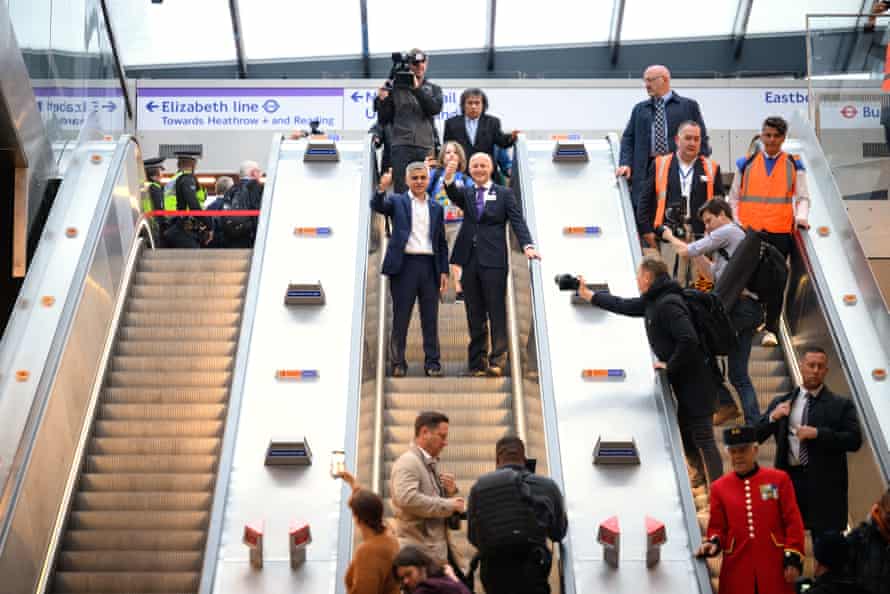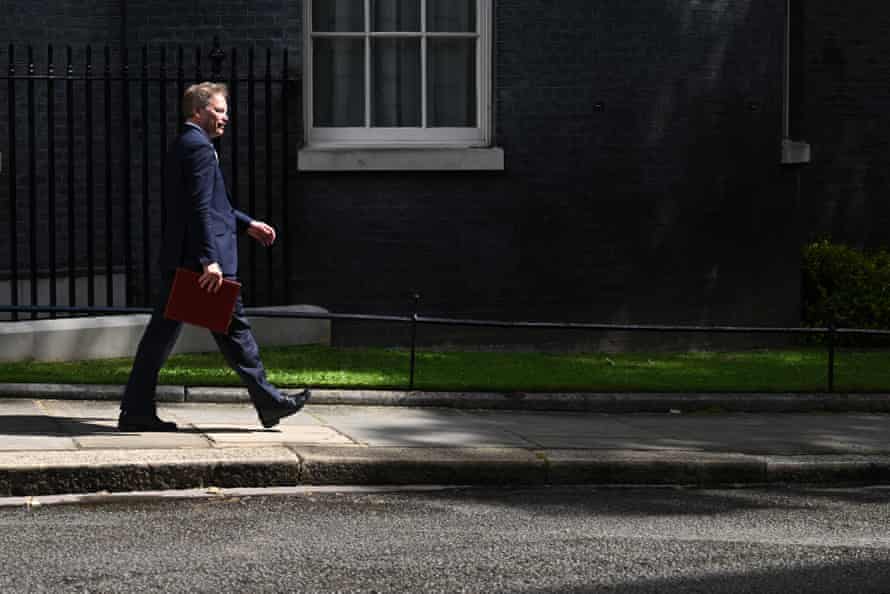
No 10 plays down, but does not firmly deny, reports PM floated with Sue Gray idea of shelving Partygate investigation
The Downing Street lobby briefing has just finished. It was longer and more informative than usual, with a lot of questions on Partygate, but also plenty of exchanges on other topics too.
Here are two of the main lines.
- No 10 has played down, but not firmly denied, reports that Boris Johnson floated with Sue Gray the idea of shelving her Partygate investigation. (See 9.14am.) Asked if it was true that at, as the Times reports, Johnson suggested the idea when he met Gray several weeks ago, the PM’s spokesperson replied:
I don’t recognise that characterisation. This is a private meeting. This was a meeting about process, rather than the contents of the report. The prime minister wants the report to be published. He is looking forward to the conclusion of the report and it being put in the public domain.
Asked a second time if the PM made that suggestion, the spokesperson replied:
The prime minister did not ask her to drop the report or not proceed with the report. As you know, it’s the prime minister who commissioned the report.
But the Times did not say Johnson asked Gray to drop the report. Instead, it says he floated the idea more obliquely. It says:
“[Johnson] asked her, is there much point in doing it now that it’s all out there?” a Whitehall source said. “He was inferring that she didn’t need to publish the report.” Another added: “They were exploring this idea of not having any report. It was being talked about [in Downing Street]. But politically they realised they couldn’t do it.”
- Public sector workers may have to accept “limited” pay restraint to avoid the risk of inflation spiralling, the spokesperson hinted. Describing what was said at cabinet this morning, the spokesperson said:
Cabinet held a discussion on public sector pay. The prime minister said the public are understandably anxious about global cost of living pressures, and that the government will continue to support those most in need. The government has already pledged to increase public sector sector spending and is awaiting decisions by public sector review bodies. However, ministers made clear that the risk of triggering higher inflation must be part of considerations when deciding pay awards this year.
When asked if this meant the government would overrule recommendations from the public sector pay review bodies, the spokesperson said that that was not what he was saying. He went on:
The point that ministers were emphasising that spiralling inflation will do more to damage people’s take home pay than the limited pay restraint that we’ve seen previously.
Asked if public sector workers would have to accept below-inflation pay increases, the spokesperson replied:
Obviously, I can’t predict exactly where inflation will go. But with inflation running so high, it does present a significant challenge to things like public sector pay. That said, it would be entirely wrong for me to jump ahead of the process. There is an independent process ongoing, and the first stage of that is for [the pay review bodies] to make recommendations to government.
I will post a full summary shortly.
This is from the Daily Mail’s Jason Groves.
Boris Johnson adopting masochism strategy to deal with Sue Gray report tomorrow. Statement to MPs, followed by meeting with Tory MPs at 1922 committee and a full press conference. Apologies expected at every stage
— Jason Groves (@JasonGroves1) May 24, 2022
Energy price cap set to rise by around £800, to around £2,800, from October, Ofgem says
Jonathan Brearley, the Ofgem chief executive, told MPs on the Commons business committee that he expects the energy price cap to rise to around £2,800 in October. He said:
I am afraid to say conditions have worsened in the global gas market since Russia’s invasion of Ukraine. Gas prices are higher and highly volatile. At times they have now reached over 10 times their normal level.
I know this is a very distressing time for customers but I do need to be clear with this committee, with customers and with the government about the likely price implications for October.
Therefore later today I will be writing to the chancellor to give him our latest estimates of the price cap uplift.
This is uncertain, we are only part way through the price cap window, but we are expecting a price cap in October in the region of £2,800.
That would amount to an increase of more than £800 for customers on default tariffs who pay by direct debit, who now have a price cap of £1,971. In April it went up by almost £700, from £1,277.
As my colleague Heather Stewart points out, the Treasury has been waiting for this figure before deciding what to include in its emergency cost of living package which is now expected to be announced soon.
This was one of the pieces of information Sunak has been saying he’s waiting for before taking more action on the cost of living crisis…(It’s not the final figure, but surely gives Treasury enough to go on…) https://t.co/HiwLQqWNmV
— Heather Stewart (@GuardianHeather) May 24, 2022
My colleague Phillip Inman has the full story here.
No 10 plays down, but does not firmly deny, reports PM floated with Sue Gray idea of shelving Partygate investigation
The Downing Street lobby briefing has just finished. It was longer and more informative than usual, with a lot of questions on Partygate, but also plenty of exchanges on other topics too.
Here are two of the main lines.
- No 10 has played down, but not firmly denied, reports that Boris Johnson floated with Sue Gray the idea of shelving her Partygate investigation. (See 9.14am.) Asked if it was true that at, as the Times reports, Johnson suggested the idea when he met Gray several weeks ago, the PM’s spokesperson replied:
I don’t recognise that characterisation. This is a private meeting. This was a meeting about process, rather than the contents of the report. The prime minister wants the report to be published. He is looking forward to the conclusion of the report and it being put in the public domain.
Asked a second time if the PM made that suggestion, the spokesperson replied:
The prime minister did not ask her to drop the report or not proceed with the report. As you know, it’s the prime minister who commissioned the report.
But the Times did not say Johnson asked Gray to drop the report. Instead, it says he floated the idea more obliquely. It says:
“[Johnson] asked her, is there much point in doing it now that it’s all out there?” a Whitehall source said. “He was inferring that she didn’t need to publish the report.” Another added: “They were exploring this idea of not having any report. It was being talked about [in Downing Street]. But politically they realised they couldn’t do it.”
- Public sector workers may have to accept “limited” pay restraint to avoid the risk of inflation spiralling, the spokesperson hinted. Describing what was said at cabinet this morning, the spokesperson said:
Cabinet held a discussion on public sector pay. The prime minister said the public are understandably anxious about global cost of living pressures, and that the government will continue to support those most in need. The government has already pledged to increase public sector sector spending and is awaiting decisions by public sector review bodies. However, ministers made clear that the risk of triggering higher inflation must be part of considerations when deciding pay awards this year.
When asked if this meant the government would overrule recommendations from the public sector pay review bodies, the spokesperson said that that was not what he was saying. He went on:
The point that ministers were emphasising that spiralling inflation will do more to damage people’s take home pay than the limited pay restraint that we’ve seen previously.
Asked if public sector workers would have to accept below-inflation pay increases, the spokesperson replied:
Obviously, I can’t predict exactly where inflation will go. But with inflation running so high, it does present a significant challenge to things like public sector pay. That said, it would be entirely wrong for me to jump ahead of the process. There is an independent process ongoing, and the first stage of that is for [the pay review bodies] to make recommendations to government.
I will post a full summary shortly.
The Conservative MP David Simmonds, who has been critical of Boris Johnson over Partygate without directly calling for his resignation, told Times Radio this morning that it would be “very difficult” for Johnson to explain why he was not lying when he told MPs that a party did not take place in Downing Street on 13 November 2020 – when he was photographed drinking at a leaving do that night. Asked if Johnson was telling the truth, Simmonds replied:
That clearly is is the question. He said in his defence previously, that it hadn’t occurred to him that one or the other events could not be considered a work event.
Now, I’m very conscious, I’ve had colleagues move on from my office during the lockdown and we knew that we needed to defer leaving drinks, leaving lunches until the restrictions were lifted. And that certainly seems to be a widespread view. So clearly, it’s a very difficult question for the prime minister to answer but he clearly needs to set out his explanation for it …
It sometimes has the feel of the old Blackadder thing about the explanation needs to be phenomenally good.

Gwyn Topham
Sadiq Khan, the mayor of London, has said he was “gobsmacked” when he saw the photos obtained by ITV News yesterday of Boris Johnson raising a wine glass at a Downing Street party. Khan told the Guardian:
I literally couldn’t believe what my eyes were telling me … I think it is right and proper that the Met police service explains how they drew their conclusions.
Yes, it is correct that there were record numbers of fines – no other property, no street in the country has had that number of fines issued.
But the public are asking questions of the police. I don’t like questions of integrity being raised around the police. That is why they should clarify those conclusions.

Real value of benefits set to fall by 5% this year because of inflation, OBR says
The Office for Budget Responsibility has published a report today on trends in welfare spending. It says that the real value of benefits is set to fall by 5% this year, or by £12bn, because they are being uprated by September’s inflation rate, which is much lower than the current inflation rate. But their value will largely be restored when benefits are uprated next year, the OBR says.
It explains:
The precise timing of inflation changes this year and last is such that the lags to benefit uprating are particularly pronounced: benefits were uprated by 3.1% this April – in line with last September’s CPI – but inflation began rising rapidly just after that and is forecast to average 8.0% across fiscal year 2022-23 as a whole, meaning the real value of benefits falls by around 5%, or £12bn in total (including pensioner spending) this year.
Our forecast assumes that benefits will rise by 7.5% in April 2023 (our March forecast for the CPI inflation rate in September this year), whereas CPI inflation is expected to average 2.4% in 2023-24 as a whole. So the real value of benefits is expected to rise by around 5% in 2023-24 (£13bn in total), largely restoring their real value after the dip in 2022-23.
Tom Larkin from Sky News is keeping a tally of Tory MPs publicly saying Boris Johnson should resign. He says there are currently 15 in this category.
Back by popular demand: here’s the current standings in the big No Confidence spreadsheet.
Roger Gale shifting this morning from the ‘not yet’ to the ‘go immediately’ column.
15 Tory MPs now publicly calling for the PM’s immediate resignation. How many more in the next 48h? pic.twitter.com/7c2iD0eJWp
— Tom Larkin (@TomLarkinSky) May 24, 2022


Haroon Siddique
Lawyers for an 82-year-old Jewish woman who was investigated three times in three years by Labour for antisemitism have written to the party demanding that it carry out an independent investigation into what it alleges was a campaign of discrimination against her. They suggest her anti-Zionism was a protected characteristic under the Equality Act.
Labour dropped the latest investigation into Diana Neslen, who regularly attends her local synagogue and keeps a kosher home, after she threatened to sue the party for unlawfully discriminating against her based on her belief in anti-Zionism.
The party was investigating her for tweets she posted about Israel and Zionism. Her lawyers, Bindmans, had said the investigation was unjustified and disproportionate, with the only admissible tweet being one from 2017, in which Neslen said “the existence of the state of Israel is a racist endeavour and I am an antiracist Jew”.
A new letter sent to Labour by Bindmans says the party’s governance and legal unit (GLU) has “failed/refused to properly investigate and/or address our client’s complaints under the party’s own policies on bullying and harassment”. It continues:
Anti-Zionist (or indeed Zionist) beliefs that are strong enough to justify protection under the EA (Equality Act) 2010 are most likely to be held by those of Jewish or Palestinian ethnicities, given it is those ethnicities that are likely to be primarily affected by such beliefs. Accordingly, harassment based on anti-Zionist beliefs equates to harassment based on ethnicity, and it is therefore submitted that the party has subjected our client to harassment on the basis of ethnicity.
In 2018, Labour, under pressure to act on allegations of antisemitism. adopted the International Holocaust Remembrance Alliance’s (IHRA’s) definition of the term. The IHRA definition of antisemitism includes as an example: “Denying the Jewish people their right to self-determination, eg by claiming that the existence of a state of Israel is a racist endeavour.”
Jewish Voice for Labour, of which Neslen is a member, says it knows of 52 Jewish Labour members, two of whom have since died, who have faced or are facing disciplinary charges relating to allegations of antisemitism.
There will be two urgent questions in the Commons at 12.30pm. The first, tabled by the Conservative MP Nusrat Ghani is on the BBC reports about China operating a shoot-to-kill policy against Uyghurs escaping prison camps, and the second, tabled by Labour’s Tulip Siddiq, is about Nazanin Zaghari-Ratcliffe being forced to sign a confession before she left Iran.


